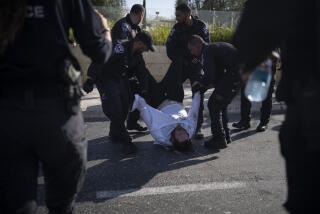Who Will Unite the Nation’s Tribes?
- Share via
JERUSALEM — The Jewish people have decided to commit suicide. That at least is one reasonable conclusion to be drawn from Israel’s current election campaign.
Though a Palestinian state is about to emerge on Israel’s doorstep, resolving for better or worse the decades-long debate over the Jewish state’s borders, the Israeli electorate is scarcely paying attention to the peace process. Instead, Israelis are focused on hatred. Not hatred between Arabs and Jews but between Jews and Jews. Hatred between secular and ultra-Orthodox. Hatred between new immigrants from Russia and veteran immigrants from Middle Eastern countries. Hatred between right-wing supporters and left-wing detractors of Prime Minister Benjamin Netanyahu. All the major fault lines in Israeli society have converged in this campaign, and the result is the political equivalent of a nervous breakdown.
In their nightly television campaign ads, politicians don’t debate the issues so much as incite against their rivals. Tommy Lapid, leader of the ultra-secular party Shinui, denounces the ultra-Orthodox for having too many children and living off secular taxpayers. Ultra-Orthodox spokesmen call Lapid, who happens to be a Holocaust survivor, a Nazi. The Russian immigrants’ party, Yisrael B’Aliya, attacks Shas, the party of the ultra-Orthodox Sephardim, or Jews of Middle Eastern origin, which uses its control of the powerful Interior Ministry to deny Israeli citizenship to Russians whose Jewishness is suspect. Shas retaliates by labeling Russians, the most educated and talented immigrants in Israel’s history, as prostitutes and mafioso. At a Labor Party rally presided over by Ehud Barak, an actress publicly mocks Likud voters as “marketplace rabble,” a racist euphemism for Sephardim, and Barak doesn’t rebuke her; the next day, Netanyahu rushes off to an outdoor market in Tel Aviv to declare that “the left hates the Sephardim” and that he is “proud to be one of the rabble.”
Despite the formidable competition, the incitement award in this election belongs to Shas. With its leader, Aryeh Deri, recently convicted on bribery charges, the party has declared war on Israel’s judicial system and on secular Ashkenazim, or Jews of European origin. In one Shas TV ad, a Sephardi man proclaims that “all the Ashkenazim hate us.” A Shas videotape, distributed in tens of thousands of copies, claims that Deri was tried because he is a Moroccan Jew, victim of a war of “white secular Ashkenazim against black traditional Sephardim.”
The old conventional wisdom warned that Israel would face civil war once it made peace with the Arabs and was no longer forced into national unity by an outside threat. But Israelis have apparently decided not to wait for peace before dismantling their common identity. The ingathering of the exiles, the process of transforming the radically disparate ethnic and cultural and ideological groups of Jews into one Israeli people, has degenerated into mean tribalism.
Perhaps our collective breakdown is a delayed reaction to the 1995 assassination of Prime Minister Yitzhak Rabin. Perhaps it is the result of living too long with untenable paradox, of simultaneously inhabiting east and west, messianic Jerusalem and hedonistic Tel Aviv, fortress Israel and prosperous high-tech Israel. Perhaps we have concluded that this tiny country, which turns every debate into a matter of life and death, can no longer contain our conflicting visions.
Can any of the candidates for prime minister become healers of Israel? Certainly not Netanyahu, who has tried to turn hatred into political gain. Nor Centrist Party head Yitzhak Mordechai, who has said all the right things about tolerance and unity but has failed to offer an increasingly skeptical electorate a coherent centrist platform.
Labor candidate Barak is trying to project himself as a unifier. He has transformed the Labor Party into the “One Israel” faction and brought in moderate religious figures as well as the former Likud Sephardi leader David Levy. But “One Israel” remains overwhelmingly left wing and secular, just like the old Labor Party that alienated half the country. Nor has Barak articulated a new vision of religious-secular relations or seriously addressed the Russian-Sephardi divide.
Whoever wins the election must make securing peace among the Jews as much a priority as achieving peace between Arabs and Jews. In the absence of inspiring leadership, perhaps the hope lies with those many Israelis disgusted by the mutual incitement tearing their society apart, and who know that too much sacrifice has gone into creating and sustaining the Jewish state for it to be whittled away from within.
More to Read
Sign up for Essential California
The most important California stories and recommendations in your inbox every morning.
You may occasionally receive promotional content from the Los Angeles Times.













